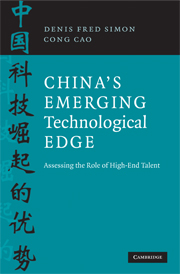Book contents
- Frontmatter
- Contents
- List of Figures and tables
- Acknowledgements
- Abbreviations
- Introduction
- 1 Human resources, technological innovation, and economic growth
- 2 China's talent challenge
- 3 Human resources in science and technology, and their structure and characteristics in China
- 4 Higher education and scientists and engineers in the pipeline
- 5 Utilization of scientists and engineers in China
- 6 “Brain drain,” “brain gain,” and “brain circulation”
- 7 Supply and demand of science and technology talent in China: key drivers
- 8 China's talent in key emerging technologies
- 9 Whither China's talent pool?
- Appendix: Understanding Chinese science and technology human resources statistics
- References
- Index
4 - Higher education and scientists and engineers in the pipeline
Published online by Cambridge University Press: 25 January 2011
- Frontmatter
- Contents
- List of Figures and tables
- Acknowledgements
- Abbreviations
- Introduction
- 1 Human resources, technological innovation, and economic growth
- 2 China's talent challenge
- 3 Human resources in science and technology, and their structure and characteristics in China
- 4 Higher education and scientists and engineers in the pipeline
- 5 Utilization of scientists and engineers in China
- 6 “Brain drain,” “brain gain,” and “brain circulation”
- 7 Supply and demand of science and technology talent in China: key drivers
- 8 China's talent in key emerging technologies
- 9 Whither China's talent pool?
- Appendix: Understanding Chinese science and technology human resources statistics
- References
- Index
Summary
The rapid increase of China's human resources in science and technology (HRST), described and analyzed in Chapter 3, is a product of the nation's rapid, continuous, and sustained economic growth during the post-Mao economic reform and open-door era. The country's growth imperative has fuelled the demand for larger and larger numbers of high-quality technical and managerial personnel. This has placed an increasing burden on the higher education system, which has been asked to provide a larger volume of capable graduates to assume crucial positions throughout the economy and society.
In recent years, higher education has become much more desirable and also more affordable to most Chinese, who recognized that investment in higher education can bring long-term benefits in terms of rising levels of compensation and greater social status. As the utility of obtaining a college degree or beyond has become more and more apparent, and taking into account the one-child family planning policies across most of China, there has been a steady acceleration in the number of students seeking higher education in China. Between 1991 and 2006, China's regular institutions of higher education turned out a total of 21 million undergraduates and 1.25 million graduate students, including 193,000 doctorates (see Table 2.1). The total enrollment in higher education, including those in various non-traditional higher education programs – from adult institutions of higher education, radio and TV universities, internet-based education, to self-learning – reached 25 million by the end of 2006.
- Type
- Chapter
- Information
- China's Emerging Technological EdgeAssessing the Role of High-End Talent, pp. 110 - 165Publisher: Cambridge University PressPrint publication year: 2009



